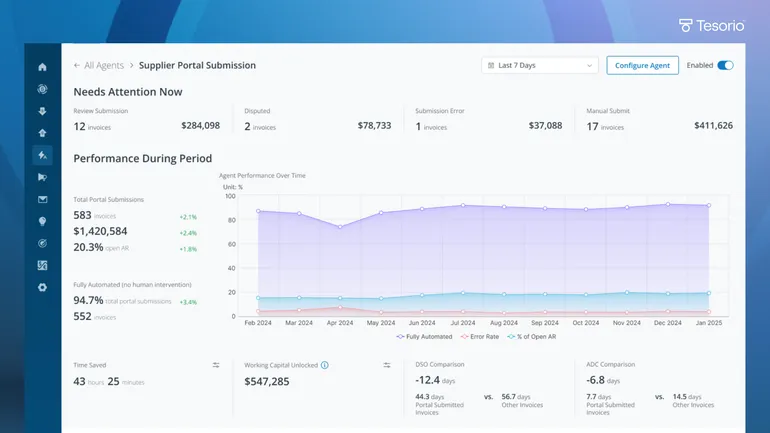
Dive Brief:
- Finance operations platform Tesorio Thursday launched its “Supplier Portals Agent,” an agentic AI tool aimed at automating the submission of invoices to supplier portals, according to a press release shared with CFO Dive.
- The AI agent aims to ease the invoice submission process by utilizing automation to fill in required fields and submit invoices to supplier portals — such as Coupa and Ariba, according to the press release.
- “We created an agent that goes into the portals on behalf of the customers, submits invoices successfully, and then we also monitor the invoice submission and approval process for them, so we automate that entire process from start to finish,” Max Dame, vice president of finance & operations for Tesorio, told CFO Dive in an interview.
Dive Insight:
The AI agent automates the often cumbersome process of submitting invoices to supplier portals — helping to shorten the days sales outstanding for businesses. On average, DSO, or the time it takes for a sale or revenue to reach a business, is 56 days, according to a 2024 report on business-to-business payments by accounts receivable software provider Upflow.
While the introduction of supplier portals mitigated some of these challenges, helping approved invoices to be paid on time, “invoice submission and approval across dozens of portals can strain suppliers’ finance teams,” Tesorio said in its release. Often, teams have “parallel” processes for “portal” and “non-portal” clients, slowing down the process further and burdening the teams with tedious work, according to the San Francisco, California-based software provider.
The genesis of the Supplier Portals Agent stemmed from looking to answer the question of, “what creates the biggest gap in the invoice to cash, order to cash cycle,” Dame said. “And interestingly enough, the main reason days were added to DSO was missing information.”
Invoices can be incorrectly formatted or lack critical information, he said, something the Supplier Portal Agent helps to solve by automatically filling out the invoice and alerting a member of the finance team of issues, Dame said. In addition to speeding up the invoicing process, the agent can also free up critical time for team members to turn to other tasks, he said.
“I’m not replacing people, but I’m replacing a task that’s really not [a] value-added [task],” he said.
The launch of the agent comes at a time when similar products are sweeping throughout the software space, with a number of high-profile companies — including Salesforce and Oracle — also debuting AI agents, CFO Dive previously reported.
While the potential of AI agents to eliminate time-consuming or manual tasks is high, many finance leaders are still hesitant to give such solutions free reign; responsible for regulatory compliance and accuracy inside their companies’ financial statements, CFOs are not just seeking speed, but transparency from such solutions.
“I do want to make sure that that I do have control of my numbers, [that] I understand what’s being done in the background,” Dame said. “So [AI agents] have to be [on] very strict guard rails, and I think that’s what most finance leaders are worried or cautious about.”
Transparency is critical when it comes to these agents, therefore; “having that visibility can’t be a black box,” Dame said.
It’s difficult to fully predict how AI agents or related technologies will be integrated into financial systems. There remains a lot of room for automation or AI inside of operational financial tasks, such as the order-to-cash process, but, on the flip side, “I’d be very cautious around financial statement generation,” Dame said.
“I want to make sure that my financial statements are reviewed by a human, by somebody who has the knowledge and experience, and I wouldn’t rely on a system to do that just yet,” he said.








